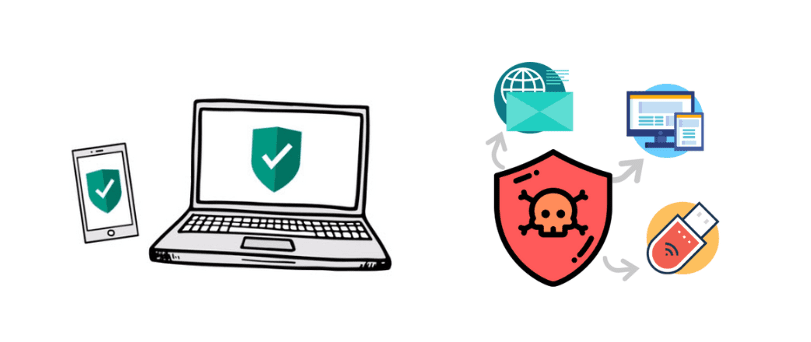The Internet presents a myriad of challenges to users, in terms of safety and security. Some of these threats are easily avoidable by adopting a commonsense approach. Social media is a case in point. It’s an immersive medium where we can easily connect with the world.
The information we volunteer on Facebook, Twitter, Instagram, Pinterest, TikTok, Vine, and Snapchat can be crushing in the wrong hands. The raison d’être for hackers is simple: steal personal, sensitive information, and use it for personal gain. They do this with absolute impunity, with no regard for the pain and suffering it causes.
Table Of Contents
Maintaining Ironclad Security Online
personal Internet practices have a big part to play in maintaining high levels of online safety. Bad habits are easily exposed by hackers. In this regard, ironclad security necessitates powerful passwords and encryption protocols.
We must aim for secure browsing practices, log out when not in session, take care when opening attachments and clicking on links, and practice due diligence when connecting new IoT devices to a network.
Equally important are timely updates of all software, applications, plug-ins, and programs. Online security threats are rampant in countries like Turkey, Taiwan, and China, and negligible in countries like Japan, Finland, Denmark, Norway, and Sweden. Viewed in perspective, one cannot negate the importance of powerful antivirus software, up next.
The Importance of Powerful Antivirus Software
Even if all of the aforementioned activities are undertaken, there is no substitute for powerful antivirus software. In fact, AV software remains one of the most important bulwarks against the nefarious advances of hackers.
No security system provides absolute protection against every perceivable threat online. The Internet is a dynamic techno-organism. It features an interconnected mass of disparate online entities, seemingly infinite in number, and boundless in scope.
We are only in the infancy stages of the World Wide Web, and yet ransomware, malware, adware, Trojans, viruses, and other online threats are already supremely advanced.
In its raw form, antivirus software serves as a powerful defense mechanism against incoming threats. It neutralizes them, quarantines them, and protects your PC, Mac, or mobile from destruction. AV programs are only as good as the companies that create them.
Tremendous research goes into developing antivirus software, updates and patches, new additions, and accouterments to the software. For example, Kaspersky antivirus software now offers new-age solutions for the tech-savvy Internet user, including essential antivirus for Windows, Mac, and mobile, blocking viruses and cryptocurrency-mining malware.
Advanced security suite options from this antivirus software include additional security options, such as encrypted browsers for protecting online transactions on PC, Mac and mobile, as well as prevention of webcam hijacks and phishing activity.
For total security protection from Kaspersky antivirus software, users get the added benefit of file protection with backups, password management, and even GPS tracking.
The Leading Providers of Antivirus Software
When it comes to leading antivirus software providers, several credible names come to mind: Norton Antivirus, McAfee Inc, ESET, Cylance Inc, Webroot, and Kaspersky. For a layperson, it can be challenging to select between highly-rated antivirus programs, given that they perform an incredible array of functions.
In cases like this, where nuanced differences make it difficult to ascertain the merits of one over the other, it can help to get more information from here, depending on your personal needs and preferences.
The market-leading provider is Symantec Corporation, the creator of Norton Antivirus. As of April 2020, this company commanded a 13.81% market share worldwide, compared to 7.8% for McAfee Inc, 11.03% for ESET, 6% for Bitdefender, 11.93% for AVAST Software a.s, 8.28% for Webroot Inc, 6.49% for Malwarebytes Corporation, and 8.73% for Cylance Inc. According to Datanyze, Kaspersky has a 1.68% market share.
The process of comparing top-tier providers of AV software is a painstaking one, given that each of them attempts to differentiate from the other with unique features and functions that are really useful to users. Two popular options in Europe and the US are Norton and Kaspersky, both highly-ranked antivirus programs with a large and growing base of users.
Norton features malware protection, optimization tools and resources, firewalls, VPNs, and cloud storage. Kaspersky offers password management, optimization tools, VPN, file recovery, parental control, firewall protection, and a sandbox.
Malicious software is continually infiltrating unsecured networks, by way of unsolicited advertising, destruction of sensitive personal data, commandeering IoT devices, or simply making devices vulnerable to attack. In all cases, it’s imperative to pick the right antivirus solution as part of an overall package of safe browsing conduct.
Antivirus Software with VPNs – The Perfect Combination?
Impressive though they may be, there are many other programs, functions, and features available as add-ons with antivirus software. For example, top-tier AV programs like Bitdefender offer VPN services and anti-tracker services too.
A VPN is a virtual private network. As its namesake suggests, this ingenious form of software reroutes your Internet traffic from your IP address to the IP address of a server through the VPN company.
There are typically hundreds, if not thousands of servers managed by the VPN provider, obfuscating your IP address from the website that you’re visiting.
Anyone on the receiving end of your information (IP address, and metadata) will have no knowledge of your computer’s IP. Despite their attractiveness as a security option, VPNs are inherently flawed.
Since the VPN companies themselves have access to all of your browsing activity, they need to be reputable. Privacy policies, user logs, and where the companies are registered play a big part in their credibility. Ideally, users want to know that the VPN provider is not part of a ‘14 Eyes’, ‘9 Eyes’, or ‘5 Eyes’ country since these alliances of countries share intelligence, and they’ve been in existence since the Cold War.
With so much going on that we are blissfully unaware of, it’s comforting to know that AV software can help to remediate many of these problems.

